Ombudswoman: 80% of Femicide Victims Killed by Persons Close to Them
ZAGREB, 10 April 2022 - In 2021, 14 women were killed, which is fewer victims than in 2020, however, 80% of them were killed by persons close to them, which is an increase and women continue to be the most frequent victims of domestic violence, Gender Equality Ombudswoman Višnja Ljubičić said in her annual report.
"Femicide, sexual harassment, period poverty and political participation of women are topics that dominated the public sphere in 2021, however, the rights of gender minorities were insufficiently discussed", Ombudswoman Višnja Ljubičić says.
Still without response to violence among persons close to one another
"Over the past seven years there has been an increase in cases of domestic violence reported as crimes and a drop in the number of such cases reported as misdemeanors, both before and during the coronavirus pandemic, with 2020 seeing a 27% rise in the number of cases of domestic violence reported as crimes", Ljubičić said.
"This was certainly also due to the pandemic, and such trends were recorded across the EU", she said.
2021 saw a slowing down in the growth of criminal acts, which is still not insignificant and stands at 12%. The number of femicide cases dropped as well, but the share of women killed by persons close to them rose.
State institutions still lack a response with which to address the causes of gender-based domestic and general violence, including violence against women, she warned.
The increase in the number of crimes and the decline in the number of femicide cases is definitely owing to increased efforts police have been investing in recent years in raising awareness and educating staff about the problem.
Stricter legislative and practical definition of domestic and gender-based violence has possibly helped reduce the number of murder cases but that will be possible to determine with certainty in the future, she said.
Civic initiatives encourage victims to testify
Ljubičić warned that in 2021 there were 100 complaints of sexual harassment, a four-fold increase from the year before, which, she said, is owing to civic initiatives that provided the victims with a public platform to present their testimonies.
An increase in reports of sexual harassment was also recorded by the Ministry of the Interior, having registered 98 such reports, with 85 of the victims being women and 13 men, she said, noting that women were more frequently victims of gender-based violence, notably sexual.
Pay gap smaller, however, not owing to policies but pandemic
According to statistics on gross pay by gender, in 2020 and 2021 the pay gap between men and women decreased.
Standing at 13% in 2019, the pay gap almost halved in 2020, to 6.9% and went up mildly to 7% in 2021.
An analysis leads to the conclusion that the reduction of the pay gap cannot be attributed to an affirmative and planned economic policy but rather to the consequences of the pandemic on the labour market, with an increase in the share of work from home and a decrease in the number of days spent on sick leave to care for a family member, Ljubičić said.
Still no election gender quotas
Last year was marked by local elections and even though the share of women in local and regional government bodies grew by 2.9%, there is still no true implementation of gender quotas, with the 27% share of women in those bodies being still far below the legally prescribed 40%, the ombudswoman warned, noting that last year's local elections were the second local elections at which fines were applied for proposers of slates not complying with the gender quota.
Ljubičić called on political parties to encourage equal participation of women in party structures and at all levels, and on prosecutorial authorities to consistently file misdemeanor charges against those not complying with the principle of equality. She urged local authorities to sign the European charter on gender equality at the local level and adopt an action plan.
Significant increase in hate crimes against LGBT community
In 2021 a significant increase in hate crimes based on sexual orientation and gender identity was registered, and for the first time in ten years the Pride parade in Zagreb was marked by a number of verbal and physical assaults on its participants.
Of a total of 101 crimes motivated by hate, 13 were motivated by the victim's sexual orientation and one by their gender identity, an increase of 75% from 2020 and of 133% from 2019.
The number of misdemeanors motivated by prejudice or hate based on sexual orientation was 315.
Asked if the significant increase could be also due to intolerant statements by politicians that could be heard often in the election campaign, Ljubičić said that inappropriate statements by politicians and other public figures can contribute to a rise in homophobia and intolerance.
Combined with the lack of systematic civic education at all levels of the education system, this can result in the demonstration of open aggression towards members of gender and sexual minorities, she said.
The ombudswoman also noted that one of the problems that was not being given adequate attention was the complex procedure of acquiring the right and access to medical services for gender minorities.
For more, check out our lifestyle section.
Croatian Conversation: 5 Years Ago There Were Almost no Women, Today it’s 50/50
23 March 2022 - Although progress has been made over the past 10 years on gender equality within Croatia and the EU, admittedly the road ahead is still a long one. In this episode of Croatian Conversation, I chat with two women in the Croatian STEM industry to get a grounded perspective on some of these issues, and improvements made over the years.
I’d like Total Croatia News readers to warmly welcome two highly accomplished women, Ivona and Nikolina, in this new episode of Croatian Conversation. Ivona is a final year computer science student at the University of Split, while Nikolina is a full-stack developer working for an international telecommunications software firm.
We’ll be hearing their perspectives on working in the STEM industry, the changing attitudes towards women in STEM, and of leaving Croatia to seek greener pastures.
Read on as we chat about positive change, career options in Dalmatia, cheap cafeteria lunches, family influences, and more.

Gender equality in STEM industries is improving. (Image: Pexels)
Thank you both for doing this! How did you come to learn about software engineering and why choose a career, or study in this field?
N: Basically, from primary school, I was good at math and physics, and it was like “Okay. I don't want to be a teacher”, and I always had problems with Croatian and with English, so I started looking more at this (technology) industry.
Also, I was deciding between medicine and engineering. When I was little, I said that I will be a kinesiologist, with diet, nutrition, and working out, but unfortunately, I didn’t have the marks (grades) for medicine.
And what about you Ivona, kind of the same outlook?
I: Actually, I was quite the opposite. I was more about languages. Yeah, but there was also a kind of, well, let’s call it a problem. I was raised in a family where everyone went to school related to some kind of IT (information technology).
My father always said that my mother is the reason why I didn't do the same and did languages instead. She said going to high school for computer science or electronics, there were a lot of men, and she didn't allow that. She told me that I would be the only girl in that school, and that might be a problem.
So, I didn't know what the next step would be for me. Even in primary school, between languages and math, I was actually good at both so, I decided to go to gymnasium for French and English.
N: I learned Italian but forgot everything. Maybe now I can still understand something. But yeah, it was bad.
Right, so you (N) liked math and physics? Yeah. And you (I) were more into languages?
I: Yeah. I wasn't sure what I wanted to do with my life (career wise). So, I just decided, “Oh, I’m good at languages”. I even studied Italian; it was cool, but when I went to gymnasium (high school), I figured out that it (languages) was not for me.
Why do you say that?
I: I don't know, I figured out that I didn’t want to teach because I’m not someone who can work with a lot of kids. And I had some problems with English during gymnasium because my teacher was quite strict. Then I thought that's (languages) definitely not for me, and the next question was, what's next? So, I decided to try this (computer science).
It's interesting that both of you say that you didn't want to be teachers. Was that a traditional career path to follow?
N: Yes, sort of, but now I sometimes I think I could (be a teacher)? But then, it was a little bit worrying when you teach the same thing every year. I think you should always get some different tasks, always create something new. In teaching, I think that is difficult.
So, you like new challenges and not doing the same repetitive tasks all the time?
N: Yeah, definitely.
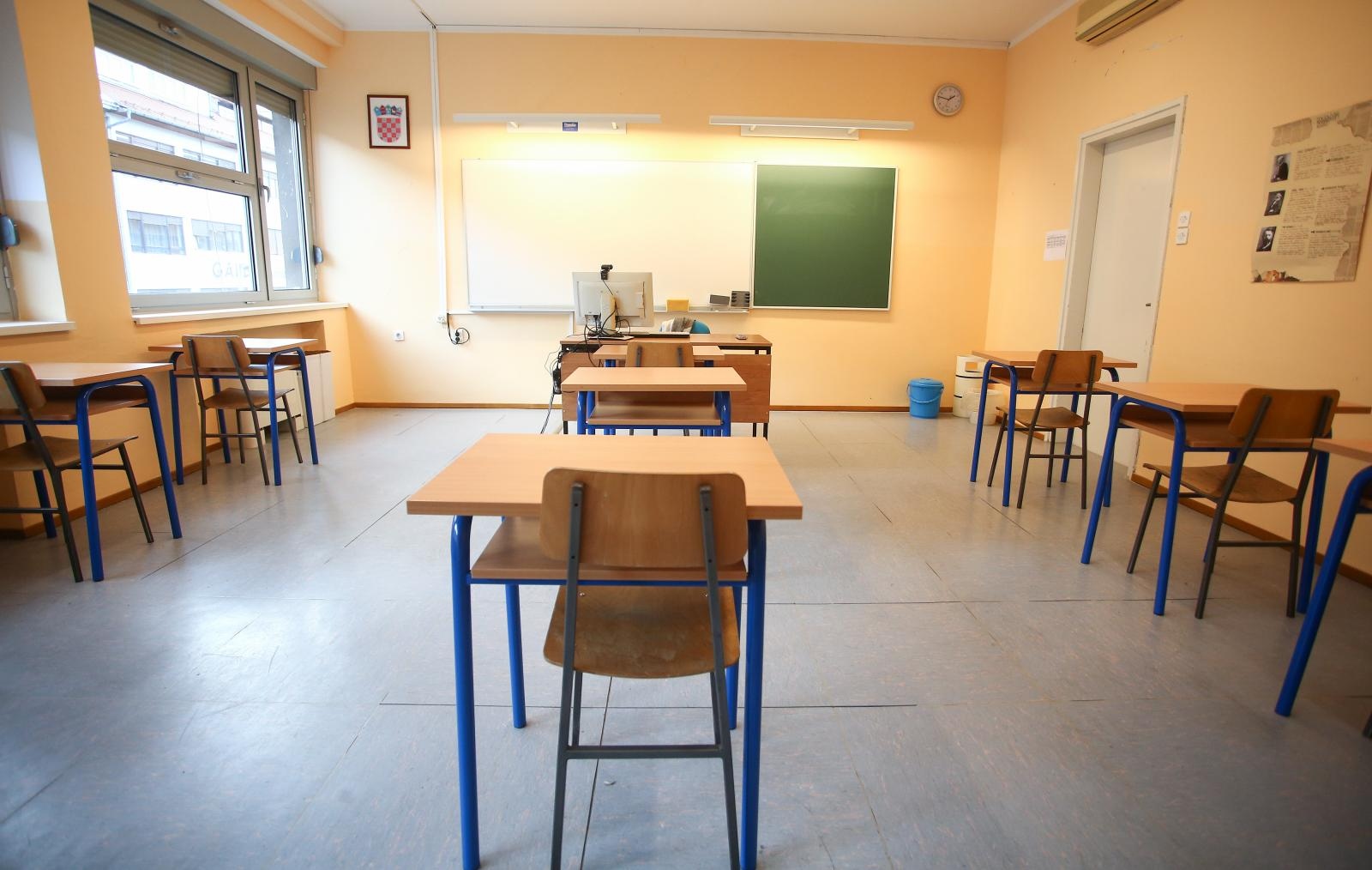
Teaching is considered a traditional career path for women in STEM. (Photo: Matija Habljak/PIXSELL)
Okay. And for you (I)?
I: From my side, it’s really hard to teach kids. It's a huge responsibility and I kind of know that in Split, it's really hard to get a job (teaching). So, that was also one big part in deciding why I have to go to college for five years (in IT), to find a job (in Split).
Right. And what about you N? Were you more certain that you would get a job within the engineering and tech industry?
N: Yeah, I think you have more options than a teacher.
Okay. And was your family supportive?
N: Yeah, they were super supportive because they did not go to college, just high school, and they pushed me to learn, to have a better life.
I: But it's very interesting that now, my mother is now the biggest motivator. She always says “you can do it now that it's different”.
That’s great!
I: Because she figured out that it’s not only a job for a man, so now she's supportive. Before, I was also thinking of whether this (industry) was for me? I don't know why I thought this way, maybe it's old school? But I think (the attitude) is changing.
Right, different times
I: Women didn't even have the same opportunities to go to school.
The conversation is interrupted by another intern from the marketing department, as we take a detour into the lives of university students in Split.
I: Would you like something from college? We have meals but only for students, there’s like a card and at the restaurant (University cafeteria), it's 50% cheaper.
Interesting, what’s this about, like how much do you pay for lunch?
I: Something like 8 kunas? (Approximately €1.06)
What do you get for 8 kunas?
N: Sometimes bad stuff.
I: Meat, salad, but it's like a meal. That means so you can choose every day you have, maybe five different dishes. And then students who live in another city or have more money. I'm from Kaštela, and I think I get around 160 kunas every month. I think this (initiative) is for all students in Croatia.
Oh cool, but let’s get back on track. So (N) you were saying you are actually an electrical engineering graduate, why did you go into programming?
N: From electrical engineering, I went to telecommunications and informatics (2-year master’s program) and applied for this job to learn more about programming because I liked the logic (behind programming) better.
I: Yeah, I also started electrical (engineering) for two years but didn’t feel like I’d learned anything. Now (with programming) I feel like I’m learning how to do something.
What about for you (I), why did you change industries?
I: Well actually, it’s not only about the job, I think to be hired, it’s also based on your projects or skills. Through studying computer science, I realized I could do something practical so that’s why I’m here (as an intern), because you can learn so much (from the internship).
I see, so computer science is more logical and hands-on.
I: The first and second year of programming was so hard for me. But basic software engineering was easier than pure theory, you get to do something. They give you the opportunity to learn and you also have a chance to ask, if you're just waiting for someone to notice you *shakes head* you can’t.
N: Yeah, you do ask a lot (of questions)
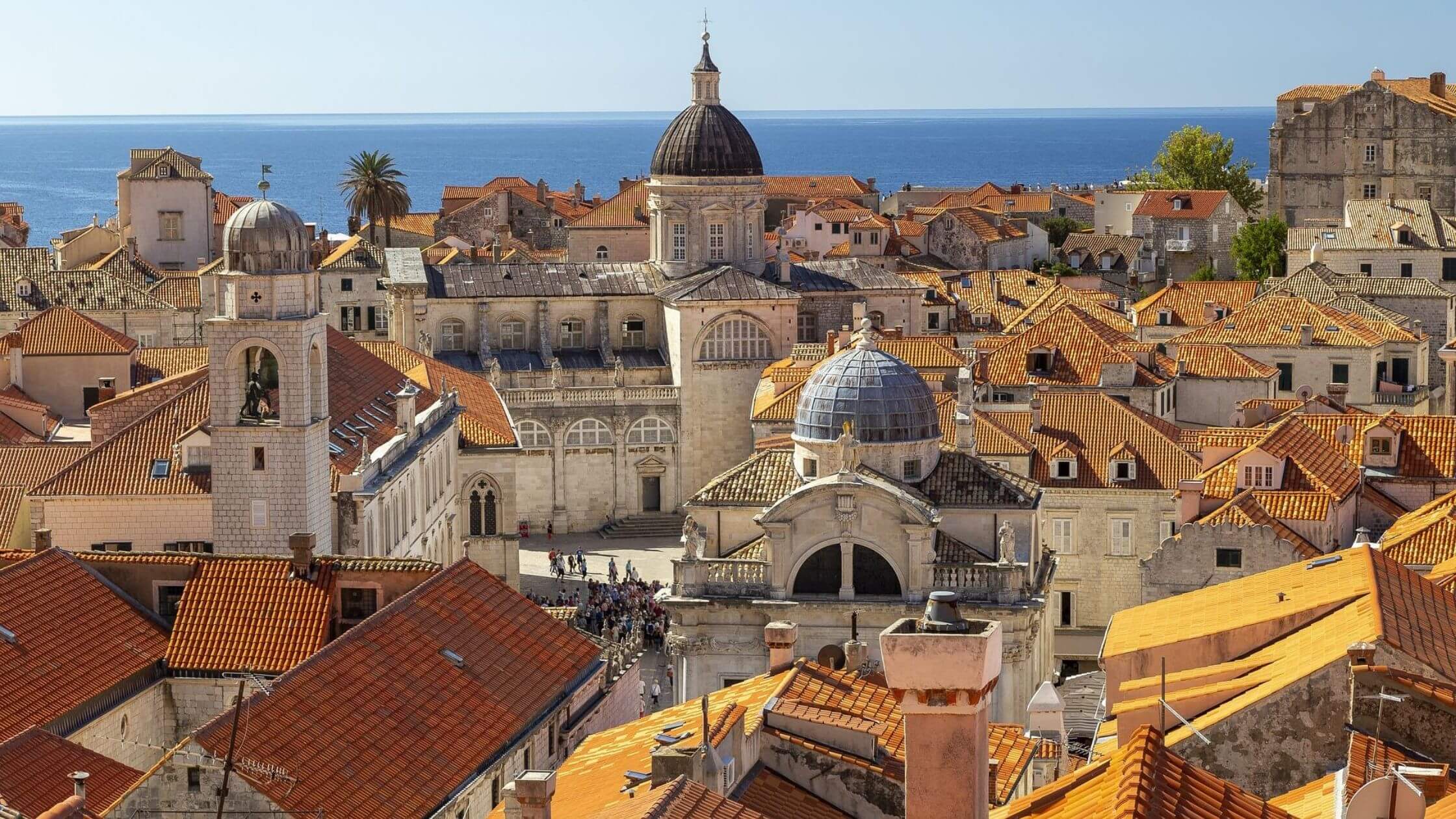
Both talk about how they enjoy the logic and rationale behind coding and programming. (Image: Pexels)
There are also a lot of people who have an engineering degree, but then they end up working outside the industry, why do you think that's the case?
I: Well, to be honest, some people just want a degree. It's not important for them what the degree is, they just want it for now and maybe one day in the future decide if they will work in the field. A lot of my friends (who graduated) were asking if this was the right decision. But their problem is they don't want to try (to get a job in the industry).
And if you try for one year or two years, however long, you have time to figure out if this is for you or not. I think that there are a lot of companies that are giving students these opportunities, but (students) are not taking them. I don’t know why.
Right. And what about you N, when you graduated? Do you find all your friends working in the field?
N: I think some are in teaching and some are still without jobs because they don't have the right skills. So, I think they are trying to create some projects to put on their CV. Basically before (this job), I applied to different companies and I was worried about my 5 years spent (in college) and if I even knew anything, so this was what scared me (regarding jobs and the industry).
I see, also do you see yourself staying in this field?
N: Sometimes I feel that this is for me, sometimes I feel it isn't. But more so I see myself staying. I think it will get better with more interesting work, but I feel I'm better here (in the software industry) generally.
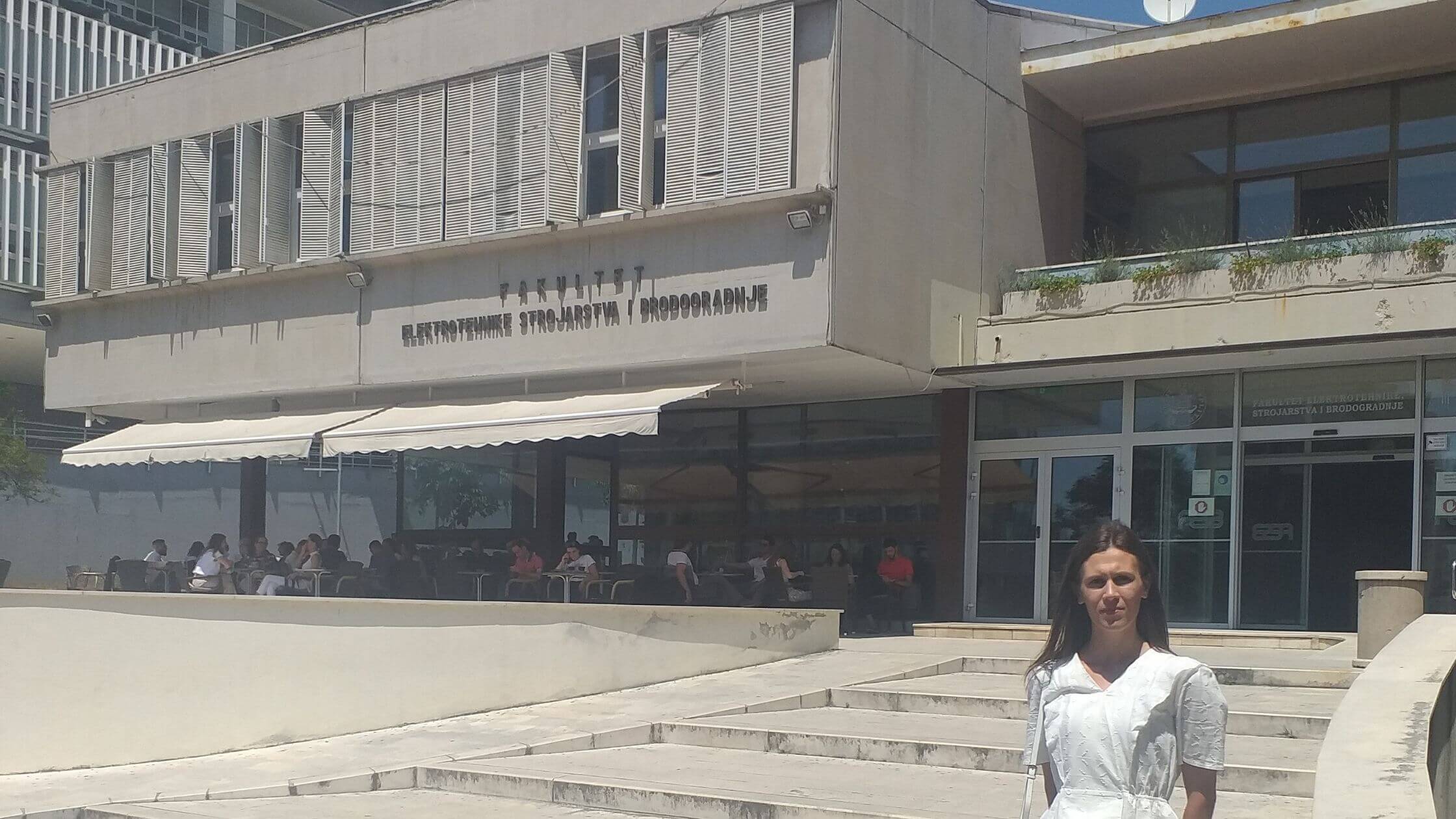
Nikolina standing outside the faculty building after successfully defending her Master's thesis. (Image: Nikolina Zelic/Personal album)
Yeah. And for you (I), do you feel as a woman in engineering any different?
I: No, I think everything is the same.
Great, so you see yourself exploring this more?
I: Yes, for now. I am really happy here. I don't know, maybe I’m different. Because at first it was difficult but my colleague, he also helps a lot. A lot! When I have some problem with anything, I can ask him.
He also really encouraged me to try after doing the hackathon here (in December 2021). If I didn't hear from someone who is working in this field for a few years, I don't know, would probably say, I'm not sure (about staying in the field). But he really encouraged me to try and said that I will learn something.
Right, that’s really cool that you have supportive colleagues. I have another question about school, did you have a lot of female engineers in your courses?
I: Yeah, but when I was in the first year, they told us that five years ago, there were almost no women in the faculty.
What do you think is the split now?
Both: 50-50? Yeah, 50-50.
Wow, ok.
I: Well, I think it's more women than men, actually. Now at least, but we can say 50-50.
N: Yeah. Maybe for telecommunications, I think there are more women.
Great, before we close, I have a final question, with the latest census results, have either of you thought of leaving Croatia? For better jobs or salaries?
N: Well, I love Canada so much.
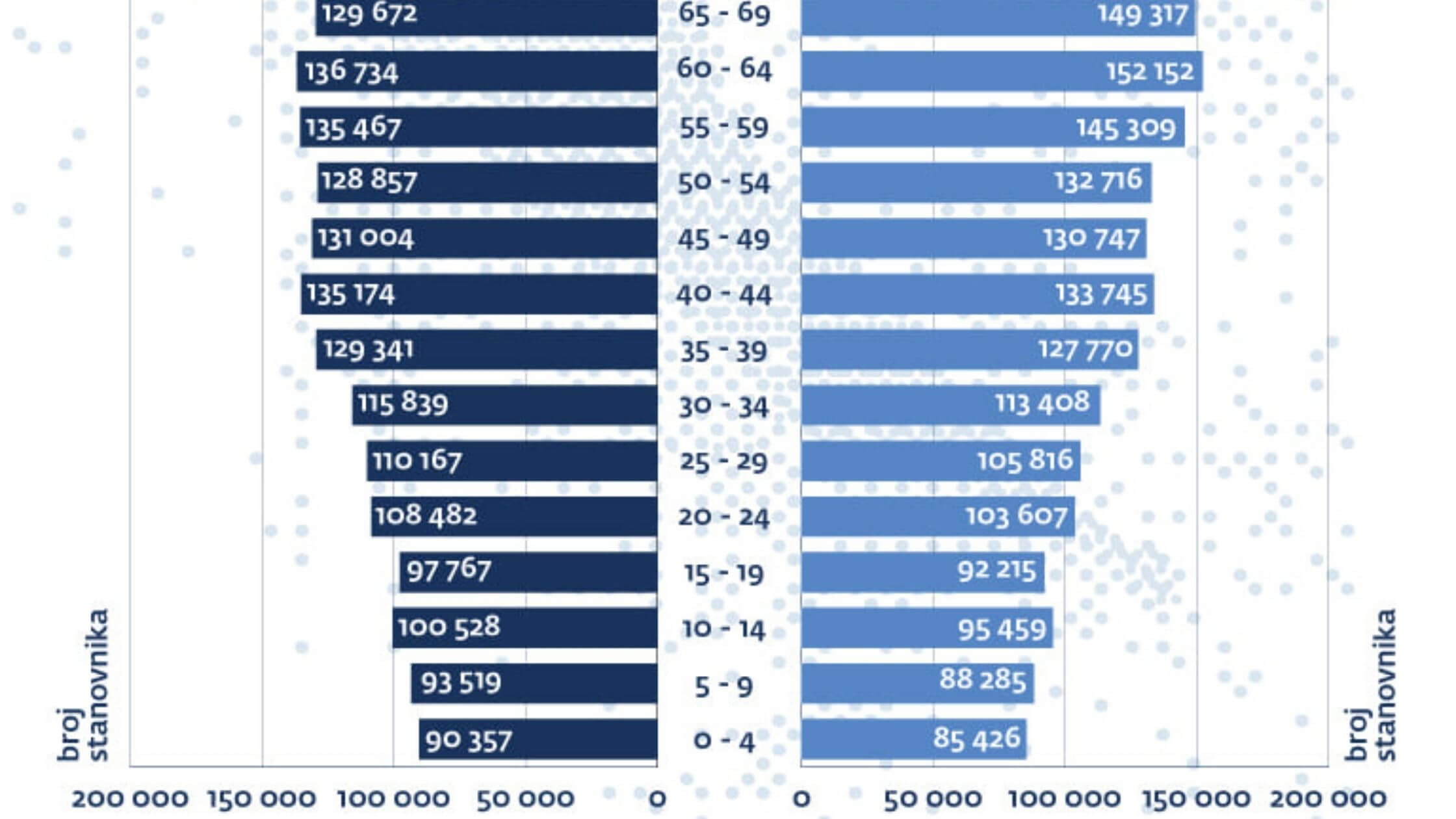
Croatia has seen a population decline of almost 10% over the last decade, with the younger generation leaving to seek better opportunities overseas. (Image: DZS/Facebook screenshot)
Have you been before?
N: No, no, no. But I just love that country. I don't know why.
Okay. Maybe something you in the media.
N: Yes, it seems much better and nicer, but it depends on the province? I just want to try, to see how it's like working in another country, in any country. It can be in Germany, if not somewhere.
For you, Ivana, you seemed more hesitant to the idea?
I: Yeah, working and living here. Definitely, I can say I would like to (continue). My friends and family are here and when I step out of the house, there’s the sea right at my door. Well, I live in Kaštela, it’s a little bit different than Split right, it's more casual but yeah, I really like it.
Cool, well thank you ladies for this chat, I feel I know more about the STEM industry and the Croatian education system in general!
For more, check our lifestyle section.
Women Work One Month For Free, Says MEP Glavak
ZAGREB, 14 July, 2021 - Women work one month for free due to lower wages and their total income, and consequently their pension, is lower because they care for children and the elderly, Croatian MEP Sunčana Glavak (EPP) said on Wednesday.
She was speaking at an event at Plitvice Lakes which discussed how to strengthen the position of women in Croatia and Europe, held as part of the Conference on the Future of Europe.
Glavak said a division into men's and women's departments was not felt in the EP because the persons there were competent, but added that a balance had not been achieved anywhere in Europe.
She called on citizens to engage in a debate on that and other European topics via the Commission's platform “futureu.europa.eu.”
Prime Minister Andrej Plenković said four women ministers in Croatia's 18 government departments was not enough, but added that they "run important departments and make a big contribution to this government."
He boasted that Croatian women hold high positions in European institutions - Dubravka Šuica is a Commission vice president, Marija Pejčinović Burić the Council of Europe secretary-general, Ivana Maletić a judge at the European Court of Auditors, and Maja Markovčić Kostelac the head of the European Maritime Safety Agency.
"As a government, we will continue to make an effort towards empowering and protecting women, towards equality and women's participation at a higher level and a high representation percentage," he said.
Present at the Plitvice conference were Tourism and Sport Minister Nikolina Brnjac, Culture and Media Minister Nina Obuljen Koržinek, Regional Development and EU Funds Minister Nataša Tramišak and Agriculture Minister Marija Vučković, while Šuica and EPP Women President Doris Pack participated virtually.
For more about politics in Croatia, follow TCN's dedicated page.
Four Schools Combating Period Poverty in Croatia
April 9, 2021 - Following Scotland's policy and relevant scientific research on period poverty in Croatia, four schools in Croatia want to help female pupils in their struggles of womanhood.
10% of women in Croatia can't afford menstrual pads and tampons – showed the results of the first big research on period poverty in the country. Following these results, as Srednja.hr reports, Machinery and Traffic School Varaždin was the first to secure free menstrual products for pupils, and three schools in Istria are on the same path.
As confirmed to Istra.In, Vladimir Gortan High School in Buje already secured free menstrual products, Pula Gymnasium's execution is coming soon, and Buzet High School is trying to find a way to implement it.
„Graduation pupils from 4.B, class of Hotel-tourist technicians came to the idea to place a pads dispenser in the girl's bathroom so that girls can take pads when needed“, said psychologist Petra Bošnjak for Istra.In.
She added that the pupils originally thought to finance this change by themselves, but the school decided they can cover the expenses, while the pupil's duty is to follow the development and fill the dispenser with new pads when needed.
„Their notion was immediately accepted and put in place“, concluded Bošnjak.
While Pula Gymnasium still hasn't put the free menstrual products scheme in practice, they announced it to start this Monday, April 12th.
„Looking at the Varaždin school, we talked with the pedagogy service in school and decided to secure free menstrual products ourselves. I think it's a good approach to be more open towards women and as a school to send a message that we want a clear approach to topics we don't speak loud enough about and to more frequently talk about topics like equality which today is very very important“, said principal of Pula Gymnasium, Filip Zoričić.
The school will finance menstrual products and which will be available to the pupils in the psychology and pedagogy office.
As already mentioned, Buzet High School wants to implement the same help to girl pupils too, but the project is in the early stages, and the school vows to do everything in its power to make it a reality. Last week, they sent an inquiry to a drug store asking to sponsor free menstrual products for the girls at Buzet High School, but the drug store so far didn't respond.
„We still didn't get an answer, but we only sent it last week. We certainly want to make this idea a reality, and we won't give up until we find a sponsor for this action“, said principal Margareta Gumilar persistently.
With different stages of success in ensuring free menstrual products for their pupils, these schools are positioning themselves as champions of positive change for gender equality. They are fighting to remove one financial struggle for the pupils that certainly gives uneven position. The prices of menstrual products in Croatia range from 10 to over 20 kunas.
For more about made in Croatia, follow TCN's dedicated page.
Are Women Safe In Croatia?
August 1, 2020 - The Twitter campaign #zeneujavnomprostoru (women in the public space) has exploded over the last two weeks, detailing stories of sexual harassment and leading many ask, are women safe in Croatia?
Croatia is recognised as one of the safest countries in Europe. And rightly so. People leave their houses and their cars unlocked all the time. It’s an abnormality that there should be a murder or a rape here.
Speak to any female who moved here from another country and they can’t believe the difference; all speak of their initial surprise and, ultimately, their confidence in being able to walk unchaperoned around any Croatian village, town or city. Croatia is incomparably safe, particularly when judged against somewhere like the UK, where you’re lucky to get through a weekend without hearing reports of one or multiple rapes.
But, just because ex-pats feel liberated in their new lives here and you almost never hear of rape, that doesn’t tell the whole story. By and large, though women are free from physical attack and brutal rape by a stranger here in Croatia, that certainly doesn’t mean we can't ask are women safe in Croatia from sexual harassment.
2019’s annual report by the Ombudsperson for Gender Equality in Croatia stated that, in the last few years, the number of complaints they received about sexual harassment “mainly in the area of labour and employment” had risen considerably.
And, in the past two weeks, Twitter has exploded in response to a campaign started by a women’s rights activist in Rijeka, Marinella Matejčić, who created the hashtag #zeneujavnomprostoru (women in the public space). So far, the campaign has received 4865 responses – retweets, people using the hashtag or women from Croatia (and some from Bosnia and Serbia) submitting stories. Matejčić has been interviewed by all of the leading Croatian portals, Balkan Insight and even the BBC about the unexpected size to which the campaign has grown.
“We already knew that harassment was widespread in public places, the workplace and so on,” says Matejčić, who attributes much of the widespread problem to Croatia still being a patriarchal society. “But, we didn’t expect we’d be able to encourage so many women to share their stories with us. I’m so grateful to those that did.”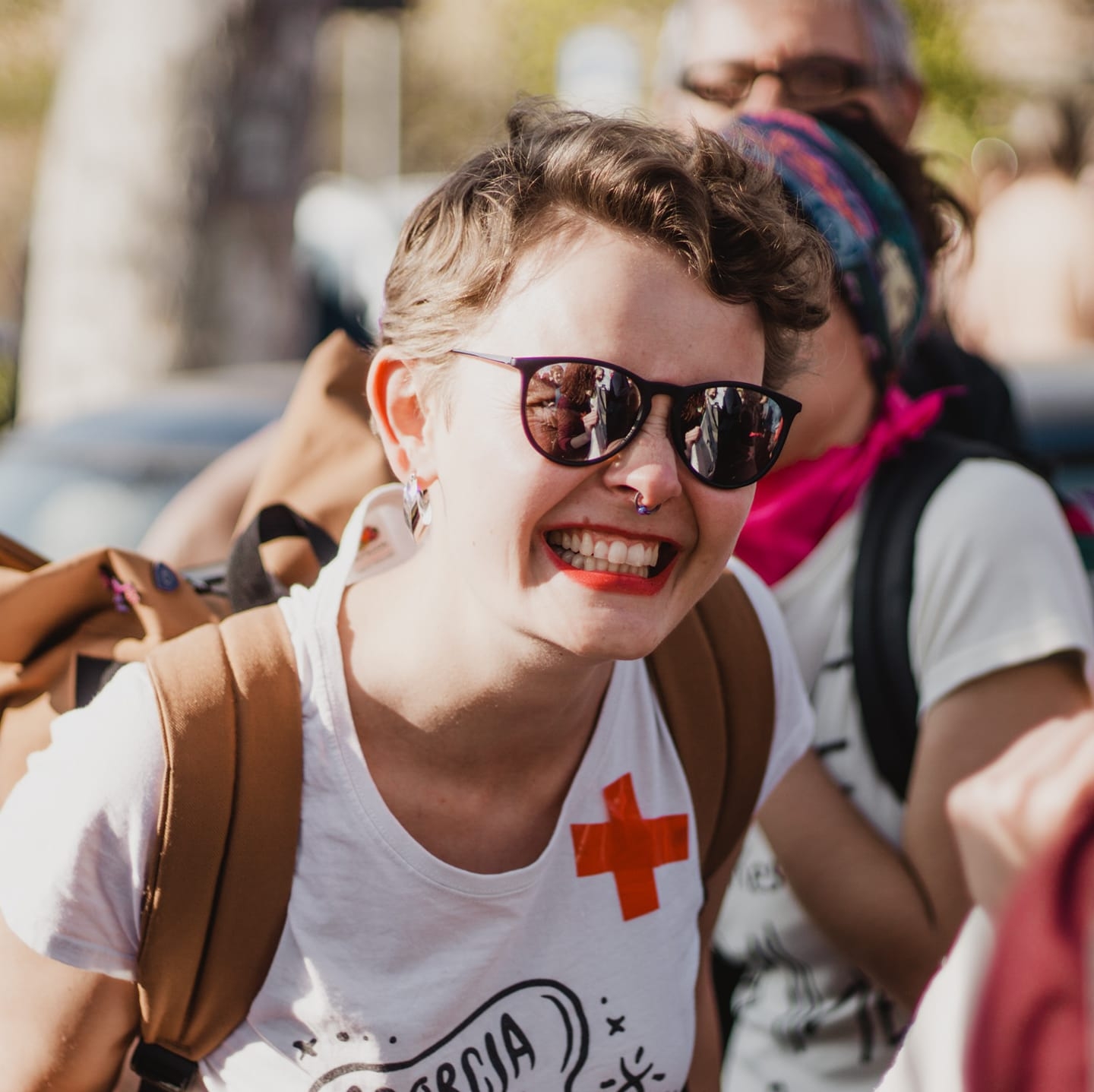
Are women safe in Croatia? Marinella Matejčić, the women's rights campaigner from Rijeka who created the #zeneujavnomprostoru (women in the public space) hashtag © Martina Šalov
“Most of the stories are about harassment,” she told TCN, although she also detailed some stories recounted about sexual behaviour towards minors. “That was the goal; to highlight that there is sexism and harassment happening all around us. We tolerate it because it’s part of the culture from where we came.”
It’s difficult to believe this horrible phenomenon exists when you’re a foreigner who feels so safe in Croatia. And when you’re a man. But, in preparation for writing these words, I asked every woman sat at my table. Each had at least one or several stories to tell, of being shouted at in the street, inappropriately touched. Two women from Zagreb both said that aroused men had pressed up against them on a packed tram. While they were on their way home from school!
“That’s normal here”, said one.
"So, if it’s normal here, does that mean you’re ok with it?”
“Certainly not!”
“It’s not so easy to get everyone to listen when you complain about women having nasty things said or done to them in the street or at work,” says Matejčić. “Some people just don’t see it as harassment. We’ve had quite the backlash. Some people say that women are just being hysterical about this, that they just can’t take a compliment. But, there’s a difference in being offered a compliment and the unwelcome harassment women receive in the street, on public transportation, or in the workplace.”
The dismissive opinions Matejčić details stem from a place of supreme arrogance and misunderstanding. If you want to know about racism, listen to the stories of a Romani family or a black man. If you want to understand homophobia, listen to a gay man or a lesbian. If you want to assess the genuine level of sexual harassment that exists, it is women whose stories need to be heard. Ignorant men have absolutely no place in this discussion other than to respectfully listen.
These problems certainly do not exist only in Croatia. Women are treated as second class citizens in many countries around the world, in many places the level of harassment is much worse. It is perhaps no bad thing that reports of sexual harassment have sharply risen here. Croatia is changing. And for the better. But there’s still some way to go before the catcalls, comments and inappropriate physical behaviour is as reviled as it deserves to be.
“I don’t think that it’s happening more,” says Matejčić, when asked to comment on the Croatian ombudsperson’s report. “I just think more women are finally coming forward to report it.”
“Catholic Church Will Not Write New Abortion Law”
Shortly after creating a storm by saying that the Church will have representatives in a working group for drafting the new abortion law, the health minister apparently changes his mind.
Condoms Fill the Sky to Mark Month of Activist-Artist Interventions in Split
Yesterday at noon, a handful of inflated condoms sailed the skies above Split, marking the opening of the event ‘Period - 28 Days of Activist-Artist Interventions in Public Spaces’, which was held at Trg Gaje Bulata in front of HNK.


